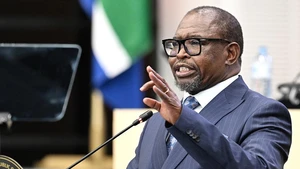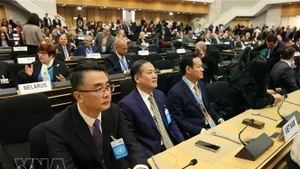To protect the blue planet, the UN calls on countries to join hands to take urgent actions, such as reducing emissions, gradually eliminating fossil fuels developing renewable energy, and supplementing finance for action towards the climate.
The UN has just released a report summarising countries' efforts to implement the 2015 Paris Agreement on climate change. The report affirmed that the world is not on the right path to achieve the long-term goals set out in the Agreement. Accordingly, current commitments to cut emissions are not enough to limit global warming to 1.5 C.
The UN Secretary-General warned that if countries do not act quickly, temperatures could increase by 2.8 C, putting the world in a dangerous situation where rising sea levels will cause many cities to flood, coral reefs to disappear, and extreme weather occurs more frequently.
According to research results recently published in the journal Advances in Atmospheric Sciences, 2023 is on track to become the hottest year on record and temperatures may continue to rise next year. Research shows that rapid global warming increases the likelihood of extreme weather events.
The worrying reality about Earth’s health shows the urgency of the fight against global climate change. To win this vital battle, experts say that countries need to focus on main fronts, including reducing greenhouse gas emissions, eliminating fossil fuels, and developing energy, regenerating and supplementing financial resources.
However, the world is showing signs of being "out of breath" in implementing solutions to protect the blue planet. After falling slightly during the COVID-19 pandemic, emissions have increased again.
In 2022, the concentration of greenhouse gas emissions reached a record level, 50% higher than pre-industrial levels. United Nations Secretary-General Antonio Guterres said that countries need to make more ambitious commitments to cutting emissions, in which developed countries and emerging economies need to achieve net zero emissions no later than 2040 and 2050, respectively.
Efforts to transition from fossil fuels to renewable energy face numerous challenges. According to recent research results from Climate Action Tracker (CAT), a scientific monitoring group that has evaluated progress in achieving the goals set out in the Paris Agreement, many governments are delaying efforts to gradually phase out fossil fuels and ignoring the opportunity to develop renewable energy.
The International Monetary Fund (IMF) estimated that global subsidies for fossil fuels increased to a record 7 trillion USD in 2022. Subsidies for oil, coal and natural gas accounted for 7.1% of the global GDP.
Meanwhile, climate finance remains a difficult problem. At the 15th session of the Conference of the Parties (COP 15) to the United Nations Framework Convention on Climate Change, held in Copenhagen (Denmark) in 2009, advanced economies pledged 100 billion USD to help developing countries meet their climate goals. However, to date, the commitment has not yet been realised. Missed appointments cause trust between countries to seriously decline.
To ensure resources for the fight against climate change, at the Climate Ambition Summit, the United Nations Secretary-General urged rich countries to increase financial support for developing countries. This is considered an important key for the world to speed up efforts to stop the Earth's rapid warming.
Egyptian Minister of Environment Yasmine Fouad said that developing countries need climate finance from 140 billion to 300 billion USD by 2030 and this number will double by 2050.
“The era of global warming has ended; the era of global boiling has arrived”, said UN Secretary-General Antonio Guterres. Governments need to accelerate emissions reductions and the transition to green energy, to reverse the long slide in achieving climate goals.
















